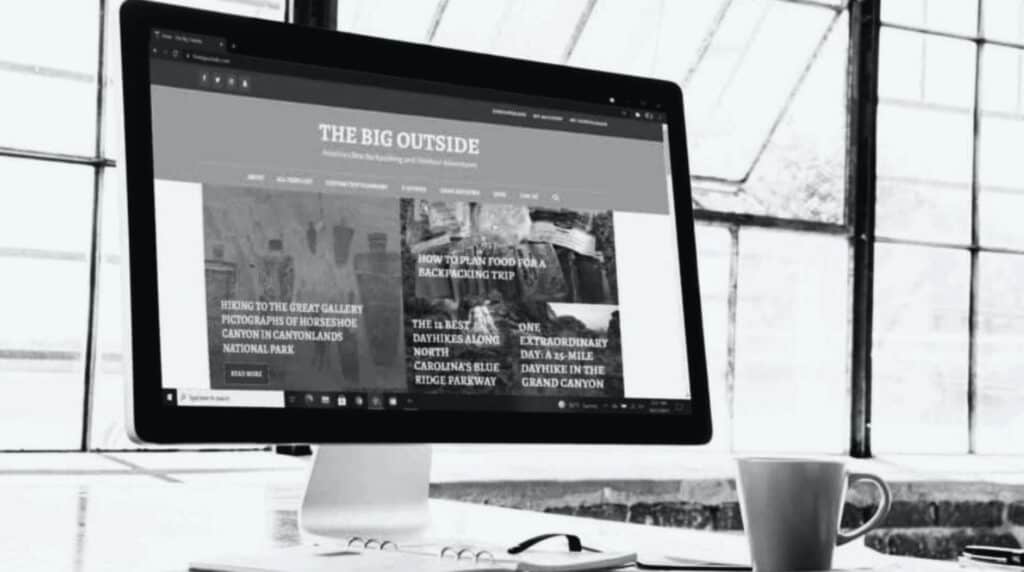Who doesn’t have social media profiles in 2023?! Any business needs to be on Facebook, IG, Twitter, TikTok, LinkedIn, Pinterest, WhatsApp, Snapchat…..
Wait, what? That’s a lot. How can you possibly keep up with all of that? Well, one of our clients had enough of social media, and decided to ditch it. All of it. This is his story. Grab some popcorn.
Michael Lanza, from The Big Outside, decided to go with his gut and take a leap of faith… and get off social media. All of it. Gone.
After being on social media for so long, and staying consistent, he simply wasn’t seeing any growth, so he started to think about it. Was it really doing anything to drive engagement and grow his audience?
Read on to learn more about his journey, how he realized social media wasn’t working for him, and what this could mean for you and your business.
Years of Social Media Presence
In an era dominated by hashtags, likes, and viral trends, it may seem unthinkable for a business or industry to not have a presence on social media. After all, social media platforms have become the go-to marketing tool for countless companies, allowing them to engage with their audience, increase brand visibility, and drive sales.
However, there is a contrary opinion that challenges the prevailing belief that every business needs to be on social media. In fact, for some businesses and industries, not being on social media can be a strategic decision that yields numerous benefits. The Big Outside is one of these businesses.
The Big Outside is a backpacking and outdoor adventure guide for America‘s outdoors that serves a mission to offer stories, images, and expert trip-planning and gear advice on the best hiking, backpacking, and other outdoor adventures.
Michael, the business owner, said he started using social media personally and for his blog in 2010. He eventually progressed to a professional website and social media profiles on Facebook and Instagram where you can view all of the expert reviews on trips and gear, stories, various images of gear and where to hike, and resources on some of the best outdoor adventures in America.
With the growth of social media in the past 10 years, you’d think it would be beneficial for his business to continue the path of consistently posting on platforms such as Instagram and Facebook. Why wouldn’t he?
The business owner himself decided to make the change and quit social media for good to see what would happen. He stopped using social media about 2 years ago, and posted his last blog-related posts in the fall of 2021. So, he had years of social media presence before he decided to get off the bandwagon and realized it was never working for him. How did he come to this conclusion?
No Conversions
After being on social media for at least 10 years, Michael just couldn’t connect the dots between engagement on social media and how it created value for his brand.
Michael said, “Social media was clearly not doing anything for my bottom line or my brand. It didn’t drive visitors or readers to my site or show positive results by any metric, including improving revenue. My numbers of followers grew at a sluggish pace and plateaued at numbers that didn’t create any value for my business. I occasionally got good interaction with posts but that still didn’t affect anything for my blog. I never saw any indications that my social media followers were becoming subscribers or customers.”
That sounds like fruitless busywork to us and it did to Michael, too. This is something business owners, new and old, should take note of. Dive into the statistics of your business. Is the value social media creates for your business worth your time? Is social media engagement aligning with your conversions? Keep track of your hours and how much time you genuinely put into social media to see if it’s worth it.
Use Your Time and Energy Wisely
From Michael’s experience, he did keep track of how many hours he spent on several different categories of job tasks for social media. From writing blogs and captions to editing photos and posting consistently, he realized it was way too time-consuming to post on all of these platforms for the value he was receiving from this work.
He says, “I began to wonder why I was wasting even a few hours a week on social media posts when I could be spending that time doing work that actually generates activity and business for my website… That’s what finally drove my decision to stop using social media and I feel much better about that choice and my revenue has grown substantially since I stopped using social media—not because I stopped using social media, because I don’t think it had any real effect on my business. But it has grown because I’ve focused on what brings people to my site instead of wasting time because I was clinging to a general consensus that everyone in business should use social media.”
Michael goes on to say, “I understand there are certain people whose status or profession enables them to build huge social media followings and use those platforms to drive a lot of business—that’s great for them. My impression is that for non-celebrities and typical small businesses like mine, social media may not deliver any value at all.”
In an age where distractions are abundant, companies that prioritize productivity and streamlined operations may find it more beneficial to dedicate their resources elsewhere. By not succumbing to the demands of managing social media accounts, these businesses can focus on core activities such as website improvement, product development, customer service, and strategic growth initiatives.
For Michael, he saw a huge improvement when he got off social media and used his time and energy in things he could see would bring more value to his business. From this conclusion, he was able to direct his focus on things that add more value to his website to create better value for the traffic there rather than spend a few hours each week providing content for social media, resulting in no value.
The Final Decision
We asked Michael if it was difficult to get off social media. He says, “Not at all. I was happy about it from the day I stopped. I saw no drawbacks. I didn’t hear from anyone who thought I should still be on social media. I’ve never been drawn back to even looking at social media for personal reasons.”
If you have a feeling it might be difficult to get off social media, or that it might affect your business negatively, take Michael’s journey and advice into consideration. He goes on to say, “I also see how some small businesses, perhaps especially local businesses where customers show up in person, may find that even a relatively small social media following helps them keep their customers informed and showing up at their business. It may keep their business (restaurant, pub, art gallery, etc.) in front of the eyes of their customers more often. I get that. For my blog, it just didn’t work…”
We asked Michael how his life has been since leaving social media for good. He says, “I’m less stressed over the time I used to spend posting on SM and fretting that it was a waste of time—plus trying to justify using SM platforms that I personally feel have been damaging to individual people, adults and teenagers, and knowingly and willfully damaging to society and American democracy.
But most of all—and this is the biggest takeaway for me—this was the right decision for my business, for the reasons I gave [previously]. When I finally asked myself whether using social media was worthwhile, the answer was obvious for me: No. Now I spend all that doing work that’s productive and useful for my customers and me and I’m not annoyed over spending time on social media that always felt like a complete waste.”
While social media undeniably offers numerous benefits to businesses and has become an integral part of modern marketing strategies, it is important to recognize that it may not be the right fit for every industry or business model. The decision to abstain from social media should be made strategically, weighing the potential advantages against the prevailing norms and expectations.
By embracing this contrary opinion and thinking critically about the role of social media in their specific context, businesses can chart their own path to success, leveraging alternative strategies that align with their unique values and objectives, just like The Big Outside has done.
Visit Michael and see his work here. If you’re interested, his free newsletter is available to everyone!






